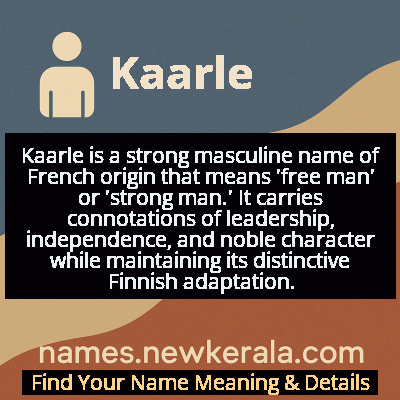Kaarle Name Meaning & Details
Origin, Popularity, Numerology Analysis & Name Meaning of Kaarle
Discover the origin, meaning, and cultural significance of the name KAARLE. Delve into its historical roots and explore the lasting impact it has had on communities and traditions.
Name
Kaarle
Gender
Male
Origin
French
Lucky Number
3
Meaning of the Name - Kaarle
Kaarle is a strong masculine name of French origin that means 'free man' or 'strong man.' It carries connotations of leadership, independence, and noble character while maintaining its distinctive Finnish adaptation.
Kaarle - Complete Numerology Analysis
Your Numerology Number
Based on Pythagorean Numerology System
Ruling Planet
Jupiter
Positive Nature
Optimistic, inspirational, and creative.
Negative Traits
Scattered, exaggerating.
Lucky Colours
Yellow, gold, purple.
Lucky Days
Thursday.
Lucky Stones
Yellow sapphire.
Harmony Numbers
1, 2, 9.
Best Suited Professions
Arts, writing, communication.
What People Like About You
Creativity, optimism.
Famous People Named Kaarle
Kaarle Krohn
Folklorist
Pioneering Finnish folklorist who developed the historic-geographic method of folklore research
Kaarle McCulloch
Cyclist
Australian track cyclist, World Champion and Olympic medalist
Kaarle Wirilander
Historian
Finnish historian known for significant contributions to Finnish historical research
Kaarle Holmberg
Actor
Finnish actor known for various television and film roles in Scandinavian cinema
Name Variations & International Equivalents
Click on blue names to explore their detailed meanings. Gray names with will be available soon.
Cultural & Historical Significance
In Finnish culture specifically, the name embodies a blend of international sophistication and local identity, often chosen by families wanting to honor both their Scandinavian heritage and broader European connections. The name's usage reflects Finland's unique position at the crossroads of Eastern and Western European influences. Throughout the 19th and 20th centuries, Kaarle became a symbol of Finnish national identity while maintaining its European roots, making it a popular choice among intellectuals and cultural leaders who valued both tradition and progress.
The name's persistence across centuries demonstrates its enduring appeal and cultural adaptability. Unlike many names that fade in and out of fashion, Kaarle has maintained a consistent presence in Finnish society, representing continuity and stability. This cultural significance extends beyond mere naming conventions to embody the Finnish character itself – resilient, internationally connected yet distinctly local, and balanced between modernity and tradition.
Extended Personality Analysis
Individuals named Kaarle are typically perceived as strong, dependable leaders with a natural authority that commands respect. They often exhibit a balanced combination of traditional values and progressive thinking, making them effective in both conservative and innovative environments. Kaarles tend to be methodical and strategic in their approach to challenges, preferring well-considered plans over impulsive decisions. Their analytical nature is complemented by practical wisdom, allowing them to navigate complex situations with grace and effectiveness.
These individuals usually possess strong organizational skills and excel in positions of responsibility where their natural leadership qualities can shine. While they can be perceived as serious or reserved initially, those who know them well appreciate their dry wit, deep loyalty, and steadfast reliability in times of need. Kaarles often become the pillars of their communities or organizations – the people others turn to for guidance and support. Their strength of character is not aggressive but rather manifests as quiet confidence and unwavering principles.
In personal relationships, Kaarles are typically devoted partners and parents who prioritize family stability and continuity. They may take time to open up emotionally but form deep, lasting bonds with those they trust. Their combination of strength and sensitivity makes them particularly effective in roles requiring both firm leadership and emotional intelligence. The name seems to attract individuals who value integrity above all else and who see themselves as stewards of traditions worth preserving.
Modern Usage & Popularity
In contemporary times, Kaarle maintains steady but selective usage, primarily in Finland and among Finnish diaspora communities. While not among the most popular names, it enjoys a classic status that prevents it from becoming dated or overly trendy. Modern parents choosing Kaarle often seek a name that balances traditional strength with international appeal, appreciating its historical depth without the burden of being overly common. The name has seen a slight resurgence in recent years as part of the broader trend toward reviving classic names with substantial historical and cultural significance. Its usage remains most concentrated in Finland, though it occasionally appears in other Nordic countries and among families with Finnish heritage worldwide. The name's relative rarity in English-speaking countries adds to its distinctive appeal for parents seeking unique yet meaningful names that honor European heritage while standing out in multicultural environments.
Symbolic & Spiritual Meanings
Symbolically, Kaarle represents strength, freedom, and noble leadership. The name carries connotations of a 'free man' in the truest sense – someone who governs themselves with integrity and commands respect through character rather than force or position. It symbolizes the bridge between tradition and progress, embodying the wisdom of the past while embracing the possibilities of the future. Metaphorically, Kaarle suggests a sturdy oak tree – deeply rooted in values and heritage, yet reaching upward toward growth and achievement. The name also symbolizes cultural synthesis, representing the harmonious blending of different European traditions into a cohesive identity that honors multiple heritages simultaneously. In many ways, Kaarle serves as a symbolic anchor, providing stability and continuity across generations while allowing for individual expression and modern adaptation. It embodies the ideal of strength with purpose – power that serves rather than dominates, and leadership that inspires through example rather than command.

